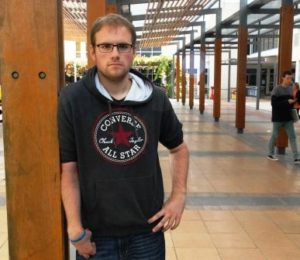
When someone tells you that they studied animal and movie law with no intention of working in either area, it’s hard not to raise an eyebrow – or even two.
But then Flinders University law graduate Kris Wilson, who will fly to the University of Oxford to begin his PhD studies later this year, has never been one to follow the conventional route.
Mr Wilson, who is of Aboriginal descent and traces his family’s roots back to Marree, grew up in the town of Quorn in the Flinders Ranges.
Quorn is a small place to the north-east of Port Augusta, which is most famous for its Pichi Richi Railway – a restored 39 km section of track between the two towns.
With a population of just over a thousand, and a local high school with around 200 students, it’s not the most obvious place to find Oxford PhD candidates.
Which brings us back to the earlier point, which is that Kris Wilson doesn’t do the obvious.
True to form, he will once again be treading unconventional ground as one of the first 32 students to study at Oxford University’s Centre for Doctoral Training in Cyber Security (CDT).
The CDT, which had its inaugural intake last year, takes 16 students a year, of which just four are accepted from outside the EU.
In spite of the prestige of being one of the first eight non-EU students in the world to be accepted for his course of study at the oldest recorded English speaking university in the world, Mr Wilson’s focus is fixed firmly on the quality of the subject matter, not the locale in which he studies it.
“The history is really appealing and I am excited about going to Oxford, but the biggest draw card is the area of study,” he said. “The intersection of law and technology is an area I’ve wanted to explore since the first year of my undergraduate studies.
“When I began studying law at Flinders I chose some of the most unusual areas of study because I could see how they would prepare me for it.
“I’ve always been fascinated by the process of how we attribute legal liability to persons (or things) for harm that may arise by their actions; considerations I began to explore in topics such as Animal Law, Law and Literature, and Media Law.
“These are the kinds of issues that you have to work through in the area of cyber security, particularly when you’re developing policy and law to govern how people’s information is used and shared online, especially when concepts of software automation are considered.
“At the moment, regulation is very ad hoc, and there is no consistency. I’d like to help develop that regulation because I believe the public needs proper and consistent protection under the law, and I want to play a part in helping them get it.”
As a student in the CDT, Mr Wilson’s first year will be spent in the centre alongside his fellow PhD candidates, where they will face an intensive course of study in topics including cyber security principles, usability, security risk management, system architectures and high-integrity systems engineering.
They will also be taught research methods and tools that will allow them to consider these topics in the context of business processes, policy and governance, international relations, and criminology, and will have access to leading thinkers and practitioners in cyber security through a programme of visits and field trips.
The next three years of his studies will be spent in the University of Oxford Law Faculty, where he will work on a long-term project based upon one, or both, of two mini-projects which he will complete at the end of his first summer.
Four years is a long time to be away from home, but Mr Wilson said he sees his future back in Australia, where he envisages dividing his time between teaching law and working with the Attorney General’s Department to develop cyber security policy.
He is an associate lecturer at Flinders and an adviser at the university’s Yunggorendi First Nations Centre for Higher Education and Research and said he also wants to continue to help and inspire other Aboriginal students.
“Working with other Aboriginal students is really important to me,” Mr Wilson said. “When they come to university, they often come with big ambitions but are lacking in confidence.
“I really enjoy being able to show them that they can achieve these ambitions and that it is possible for them to do what they set out to. This is something that I want to keep doing.”

